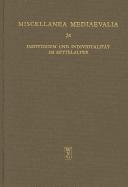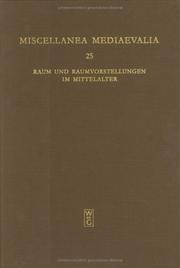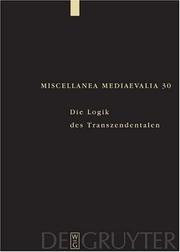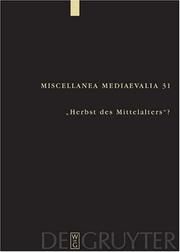| Listing 1 - 10 of 42 | << page >> |
Sort by
|
Book
ISBN: 9004105859 9004451420 Year: 1996 Volume: 52 Publisher: New York E. J. Brill
Abstract | Keywords | Export | Availability | Bookmark
 Loading...
Loading...Choose an application
- Reference Manager
- EndNote
- RefWorks (Direct export to RefWorks)
Filosofie [Middeleeuwse ] --- Medieval philosophy --- Middeleeuwse filosofie --- Philosophie médiévale --- Philosophy [Medieval ] --- Transcendantaux --- Transcendentalia --- Transcendentals --- Philosophy, Medieval --- Scholasticism --- Metaphysics --- Transcendentalism --- Scolastique --- Métaphysique --- Transcendantalisme --- Thomas, --- Criticism and interpretation --- Critique et interprétation --- 1 THOMAS AQUINAS --- Ontology --- Filosofie. Psychologie--THOMAS AQUINAS --- Thomas Aquinas, Saint --- -Contributions in doctrine of analogy --- 1 THOMAS AQUINAS Filosofie. Psychologie--THOMAS AQUINAS --- Philosophie médiévale --- Métaphysique --- Critique et interprétation --- Akʻvineli, Tʻoma, --- Akvinietis, Tomas, --- Akvinskiĭ, Foma, --- Aquinas, --- Aquinas, Thomas, --- Foma, --- Thomas Aquinas, --- Tʻoma, --- Toma, --- Tomas, --- Tomasu, --- Tomasu, Akwinasu, --- Tomasz, --- Tommaso, --- Tʻovma, --- Тома, Аквінський, --- תומאס, --- תומס, --- اكويني ، توما --- Transcendentals. --- Criticism and interpretation. --- Ākvīnās, Tūmās, --- اكويني، توما, --- آکويناس، توماس,
Book
ISBN: 9789004225848 9789004225855 9004225854 9781280126758 1280126752 9004225846 9786613530615 Year: 2012 Volume: 107 Publisher: Leiden Boston Brill
Abstract | Keywords | Export | Availability | Bookmark
 Loading...
Loading...Choose an application
- Reference Manager
- EndNote
- RefWorks (Direct export to RefWorks)
The origin of transcendental thought is not to be sought in Kant's philosophy but is a medieval achievement. This book provides for the first time a complete history of the doctrine of the transcendentals, from its beginning in the "Summa de bono" of Philip the Chancellor (ca. 1225) up to its most extensive systematic account in the "Metaphysical Disputations" of Francisco Suárez (1597). The book also shows the importance of the doctrine for the understanding of philosophy in the Middle Ages. Metaphysics is called "First Philosophy", not because it deals with the first, divine being, but because it treats that which is first in a cognitive sense, the transcendental concepts of "being", "one", "true" and "good". Winner of the Journal of the History of Philosophy Book Prize competition for the best book in the history of western philosophy published in 2013.
Transcendentals --- Philosophy, Medieval. --- Transcendentaux --- Philosophie médiévale --- Philosophie transcendantale --- Transcendentalism --- Histoire --- History. --- 291.1 --- Medieval philosophy --- Scholasticism --- Godsdienstfilosofie --- 291.1 Godsdienstfilosofie --- Philosophie médiévale --- Philosophy, Medieval --- History --- Philosophie médiévale. --- Histoire. --- Philosophie médiévale.
Book
ISBN: 8431321407 Year: 2003 Publisher: Pamplona Eunsa
Abstract | Keywords | Export | Availability | Bookmark
 Loading...
Loading...Choose an application
- Reference Manager
- EndNote
- RefWorks (Direct export to RefWorks)
Book
Year: 1999 Publisher: Universität zu Köln,
Abstract | Keywords | Export | Availability | Bookmark
 Loading...
Loading...Choose an application
- Reference Manager
- EndNote
- RefWorks (Direct export to RefWorks)
Article
Abstract | Keywords | Export | Availability | Bookmark
 Loading...
Loading...Choose an application
- Reference Manager
- EndNote
- RefWorks (Direct export to RefWorks)

ISBN: 3110148927 1306399769 3110824736 9783110148923 Year: 1996 Volume: 24 Publisher: Berlin de Gruyter
Abstract | Keywords | Export | Availability | Bookmark
 Loading...
Loading...Choose an application
- Reference Manager
- EndNote
- RefWorks (Direct export to RefWorks)
Philosophy, Medieval --- Scholasticism --- Individuality --- Civilization, Medieval --- Individuation (Philosophy) --- Philosophie médiévale --- Scolastique --- Individualité --- Civilisation médiévale --- Individu (Philosophie) --- Philosophy --- Philosophie --- 129 --- 17.023.31 --- #GROL:SEMI-1'04/14' Misc 24 --- Oorsprong en lot van de individuele ziel. Onsterfelijkheid. Reïncarnatie --- Individu --- 17.023.31 Individu --- 129 Oorsprong en lot van de individuele ziel. Onsterfelijkheid. Reïncarnatie --- Philosophie médiévale --- Individualité --- Civilisation médiévale --- Philosophy [Medieval ] --- Congresses --- Civilization [Medieval ] --- History --- Philosophical anthropology --- Individuality. --- Philosophy, Medieval. --- Medieval philosophy --- Psychology --- Conformity --- Identity (Psychology) --- Likes and dislikes --- Personality --- Self --- anno 500-1499 --- Individu et societe --- Individualisme --- Moyen age --- Individu (philosophie) --- Recherche --- Moeurs et coutumes --- Histoire des mentalités --- Individu (métaphysique)

ISBN: 3110157160 1306272505 3110802058 9783110157161 Year: 1998 Volume: 25 Publisher: Berlin de Gruyter
Abstract | Keywords | Export | Availability | Bookmark
 Loading...
Loading...Choose an application
- Reference Manager
- EndNote
- RefWorks (Direct export to RefWorks)
Philosophy, Medieval --- Cosmology, Medieval --- Astronomy, Medieval --- Physics --- Philosophie médiévale --- Cosmologie médiévale --- Astronomie médiévale --- Physique --- Congresses --- History --- Congrès --- Histoire --- Space and time --- Civilization, Medieval --- Philosophie médiévale --- Cosmologie médiévale --- Astronomie médiévale --- Congrès --- Philosophy [Medieval ] --- Civilization, Medieval. --- Cosmology, Medieval. --- Space and time. --- Space of more than three dimensions --- Space-time --- Space-time continuum --- Space-times --- Spacetime --- Time and space --- Fourth dimension --- Infinite --- Metaphysics --- Philosophy --- Space sciences --- Time --- Beginning --- Hyperspace --- Relativity (Physics) --- Medieval cosmology --- Medieval civilization --- Middle Ages --- Civilization --- Chivalry --- Renaissance --- Perception spatiale

ISSN: 05444128 ISBN: 3110169339 1306399335 3110820579 9783110169331 Year: 2001 Volume: 28 Publisher: Berlin de Gruyter
Abstract | Keywords | Export | Availability | Bookmark
 Loading...
Loading...Choose an application
- Reference Manager
- EndNote
- RefWorks (Direct export to RefWorks)
378.4 <44 PARIS> --- Universiteiten--Frankrijk--PARIS --- Philosophy, Medieval. --- Theology --- History --- Université de Paris --- History. --- 378.4 <44 PARIS> Universiteiten--Frankrijk--PARIS --- Didactics of philosophy --- Christian theology --- anno 1300-1399 --- France --- Philosophy, Medieval --- Philosophie médiévale --- Théologie --- Histoire --- Université de Paris --- Theology [Doctrinal ] --- Middle Ages, 600-1500 --- Paris (France) --- Philosophy [Medieval ] --- Université de Paris. Faculté de théologie --- Middle Ages, 500-1500 --- Université de Paris. --- Universite de paris --- Theologie medievale --- Philosophie medievale --- Moyen age --- Philosophie --- Théologie chrétienne --- Étude et enseignement

ISSN: 05444128 ISBN: 3110177056 9786612196300 1282196308 3110204584 9783110204582 9783110177053 Year: 2003 Volume: 30 Publisher: Berlin de Gruyter
Abstract | Keywords | Export | Availability | Bookmark
 Loading...
Loading...Choose an application
- Reference Manager
- EndNote
- RefWorks (Direct export to RefWorks)
The series MISCELLANEA MEDIAEVALIA was founded by Paul Wilpert in 1962 and since then has presented research from the Thomas Institute of the University of Cologne. The cornerstone of the series is provided by the proceedings of the biennial Cologne Medieval Studies Conferences, which were established over 50 years ago by Josef Koch, the founding director of the Institute. The interdisciplinary nature of these conferences is reflected in the proceedings. The MISCELLANEA MEDIAEVALIA gather together papers from all disciplines represented in Medieval Studies - medieval history, philosophy, theol
Transcendentals. --- Duns, Jean, --- Duns, Joannes, --- Duns, Johannes, --- Duns, --- Duns Scoto, Giovanni, --- Duns Scoto, Juan, --- Duns Scotus, J. --- Duns Scotus, Johannes, --- Duns Skot, Ioann, --- Duns Szkot, Jan, --- Ioannes Duns, --- Joannes Duns, --- Scot, Jean Duns, --- Scoto, Juan Duns, --- Scotus, Joannes Duns, --- Scotus, John Duns, --- Skotus, Johannes Duns, --- Дунс Скот, Иоанн, --- Aertsen, Jan. --- Transcendantaux --- Transcendentalia --- Transcendentals --- Ontology --- Philosophy, Medieval. --- Philosophy --- Medieval philosophy --- History. --- Duns Scotus, John, --- Scholasticism --- Thomas, --- Aertsen, Johannes Adrianus --- Akʻvineli, Tʻoma, --- Akvinietis, Tomas, --- Akvinskiĭ, Foma, --- Aquinas, --- Aquinas, Thomas, --- Foma, --- Thomas Aquinas, --- Tʻoma, --- Toma, --- Tomas, --- Tomasu, --- Tomasu, Akwinasu, --- Tomasz, --- Tommaso, --- Tʻovma, --- Тома, Аквінський, --- תומאס, --- תומס, --- اكويني ، توما --- Philosophy, Medieval --- History --- Philosophie médiévale --- Philosophie --- Histoire --- Aertsen, Jan A. --- Philosophy [Medieval ] --- Ākvīnās, Tūmās, --- اكويني، توما, --- آکويناس، توماس, --- Aertsen, Jan --- Aertsen, Johannes Adrianus, --- Aertsen, Jan A., --- Ontology - History. --- Philosophy - History. --- Thomas, - Aquinas, Saint, - 1225?-1274. --- Duns Scotus, John, - ca. 1266-1308. --- Transcendance (philosophie) --- Universaux (philosophie)

ISSN: 05444128 ISBN: 3110182610 9786613396815 1283396815 3110204541 9783110204544 9783110182613 9781283396813 6613396818 Year: 2004 Volume: 31 Publisher: Berlin De Gruyter
Abstract | Keywords | Export | Availability | Bookmark
 Loading...
Loading...Choose an application
- Reference Manager
- EndNote
- RefWorks (Direct export to RefWorks)
Nach wie vor wird das Verhältnis des späten Mittelalters zur anbrechenden Neuzeit kontrovers diskutiert. Manche sehen im 14. und 15. Jahrhundert eine Periode des Verfalls, andere betonen die prägende und innovative Rolle dieser Epoche für die Neuzeit. Der 31. Band der Miscellanea Mediaevalia wirft einen interdisziplinären Blick auf diese Zeitspanne und wendet sich dabei auch kritisch klassischen Einschätzungen zu.Die über dreißig Beiträge behandeln die Philosophie des Spätmittelalters (mit besonderer Berücksichtigung der Moral- und der Naturphilosophie), spätmittelalterliche Wissenschaftsinstitutionen, die Architektur, die Wirtschafts- und Rechtsgeschichte, die Spiritualität im Spätmittelalter, aber auch so prominente Figuren wie Jean Gerson und Nikolaus von Kues. The relationship between the Late Middle Ages and the beginning of modern times is still a controversial topic discussed. Some view the 14th and 15th century as a period of decline, others emphasize this era’s formative and innovative role in modern times. Volume 31 of Miscellanea Mediaevalia takes an interdisciplinary look at this period while addressing critical, classic evaluations. More than 30 contributions discuss the philosophy of the Late Middle Ages (with special attention to moral and natural philosophy), scientific institutions of the Late Middle Ages, the architecture, economic and legal history, and the spirituality in the Late Middle Ages, as well as prominent figures such as Jean Gerson and Nicholas of Cusa.
Theology, Scholastic --- Huizinga, Johan, --- Civilization, Medieval. --- Scholasticism. --- Civilization, Medieval --- Medieval civilization --- Middle Ages --- History --- Civilization --- Philosophy --- Philosophy, Medieval --- Chivalry --- Renaissance --- Christian church history --- History of civilization --- anno 1400-1499 --- anno 1300-1399 --- Congresses. --- Philosophie médiévale --- Congresses --- Congrès --- Civilization [Medieval ] --- Middle Ages - History - Congresses. --- Philosophy, Medieval - Congresses. --- Civilization, Medieval - Congresses
| Listing 1 - 10 of 42 | << page >> |
Sort by
|

 Search
Search Feedback
Feedback About UniCat
About UniCat  Help
Help News
News